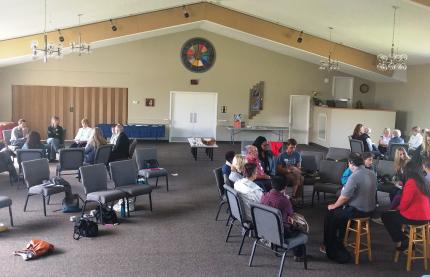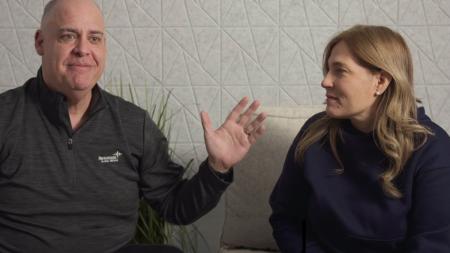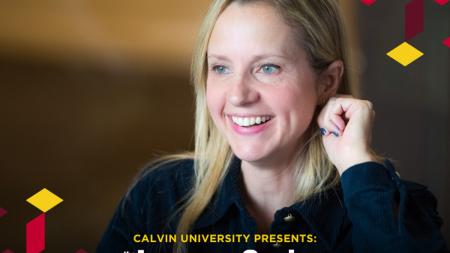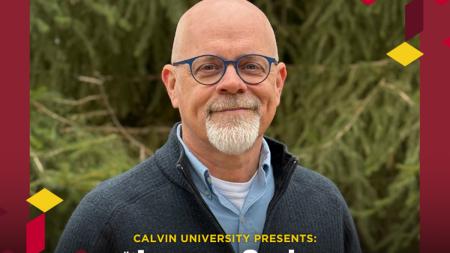Conference Helps Congregations Connect with Their Community

Kristen deRoo VanderBerg
At the back of the sanctuary, a white-painted door was set up as a table and covered in small rocks.
Each rock was printed with a short message such as “you are loved,” “you are strong,” “peace,” “joy,” or “live fully.” It was an intentional symbol designed for those gathering at Meadowvale Community Church in Mississauga, Ont., on Saturday, Sept. 9.
“The rocks are a gift to you for coming today,” said Rev. Sam Cooper, pastor at the church, as he welcomed 30 people to an event called Connecting with Your Community. The rocks were placed on the door, he said, in recognition that “there are doors of accessibility that we want to open today.”
Connecting with Your Community was the first event of its kind, cohosted by three Christian Reformed Church ministries: Disability Concerns, Safe Church Ministry, and the Office of Race Relations.
“Our communities and our congregations include people of various ethnicities, abilities, and experiences. Many carry the scars from painful experiences arising from the prevalent sins of our culture, including racism, ableism, and sexism,” wrote Bonnie Nicholas, director of Safe Church Ministries, in the promotional material for the event.
The conference was designed to help local congregations identify a few ways they can fight against these harmful realities and honor each and every person in their midst. It included presentations by staff from the three host ministries, as well as a panel discussion with staff from three community organizations in the greater Toronto area.
For example, Bernadette Arthur from the Office of Race Relations led attendees in a group activity involving tossing and catching invisible balls.
“We couldn’t see the ball, but we could still play the game,” she said afterward. “That is like the reality of race in Canada.”
Arthur pointed out that the idea of race is a social construct that Canadians don’t like to talk about but has been knit into our reality. Issues such as police profiling and conditions on First Nations reserves are examples of the racism that Canadians experience.
In another activity, Mark Stephenson, from Disability Concerns, asked people to write their personal strengths and weaknesses on puzzle pieces.
“When we all put our strengths and weaknesses together, we find that one person’s strength can complement someone else’s weakness,” he said. “What happens with people who have disabilities, however, is that other people see the parts that the person isn’t very good at and assume that defines the whole person. We fail to see the contributions they can make.”
Other presentations covered topics such as abuse prevention, community living for those with disabilities, sexual misconduct abuse response, and creating learning opportunities to explore diverse cultures. These were led by Jane Postma, a volunteer safe church team member from Faith CRC in Burlington, Ont.; Rod Friesen, the restorative justice program coordinator for the Mennonite Central Committee in Ontario; Diane Plug, a board member of Community Living in Sarnia, Ont.; and Louise Nobel Ambrose, an advocate for women, children, and Afro-Caribbean culture in Hamilton, Ont.
“We want to find more ways of doing ministry together,” Rev. Reggie Smith, director of the CRC’s offices of Race Relations and Social Justice, said, giving the the reason for the variety of workshop topics. He also pointed out that while the CRCNA has many resources and tools it can offer from its home offices, “we know that the bulk of ministry is done at the local level, on the ground, in local contexts, with local champions. Our job is to come alongside and support them.”
Attendees were encouraged to ask questions and share their personal experiences. Some were already working in their local churches as disability advocates, safe church advocates, or champions for racial reconciliation. Others came because they felt called to be involved in that kind of ministry at their congregation but were unsure how to begin.
The community learning agreement for the day promised that attendees would be fully present and engaged, would be open to feeling discomfort, and would be encouraged to speak their truth — and that whatever was shared would be kept confidential.
As questions arose, attendees were directed to resources and staff who could help them. Other attendees also shared their experiences as examples of ways forward.
At the end of the morning, attendees were asked to spend some time in prayer asking God, “What area of ministry should we be exploring, strengthening, or developing as a church community?”
Attendees were then dismissed for the day and encouraged to take a rock on their way out. Each rock removed from the door represented a person who was willing to take one step in ministry, and each rock lifted made it more likely that the “door to accessibility” could be opened.


